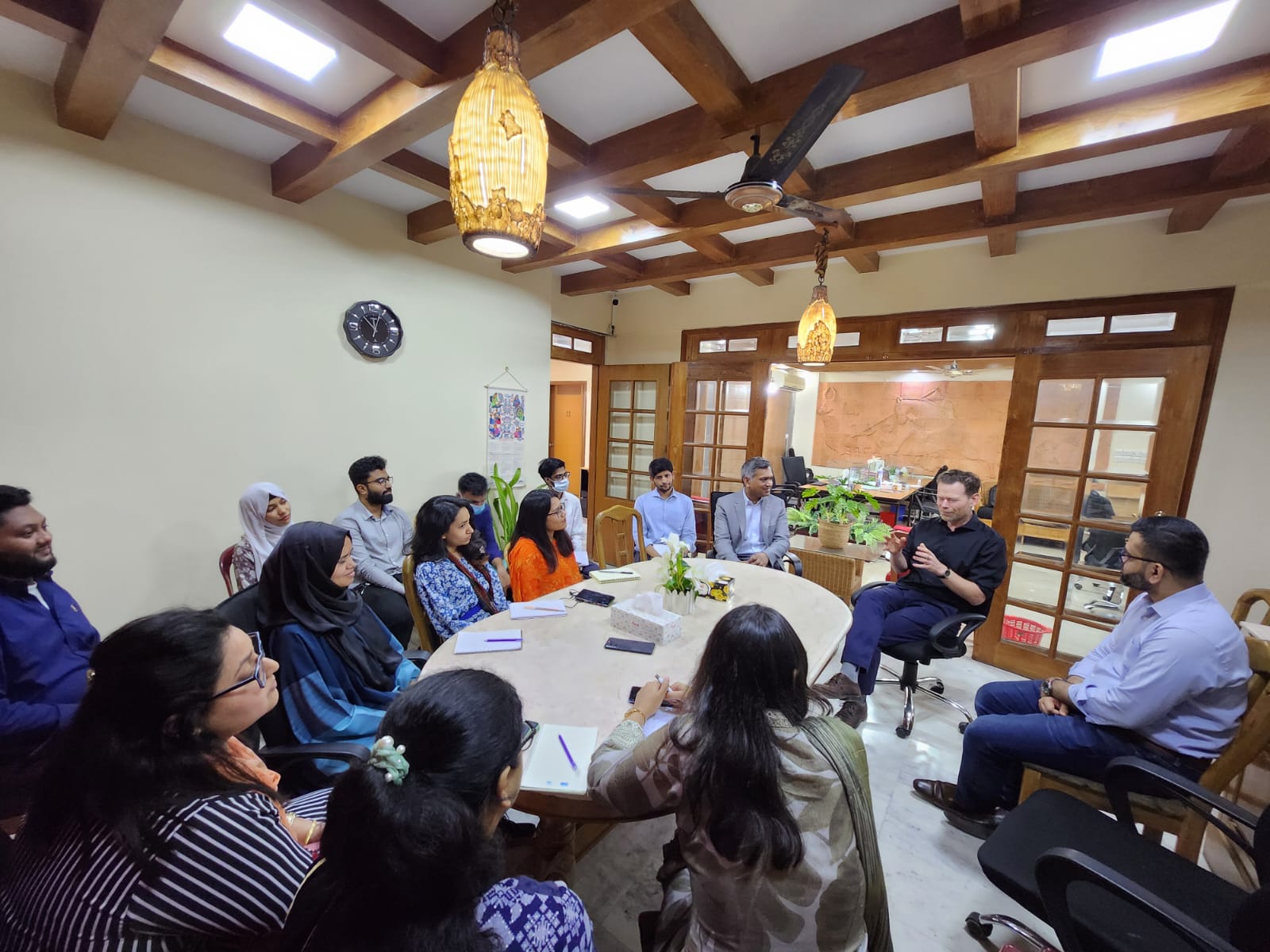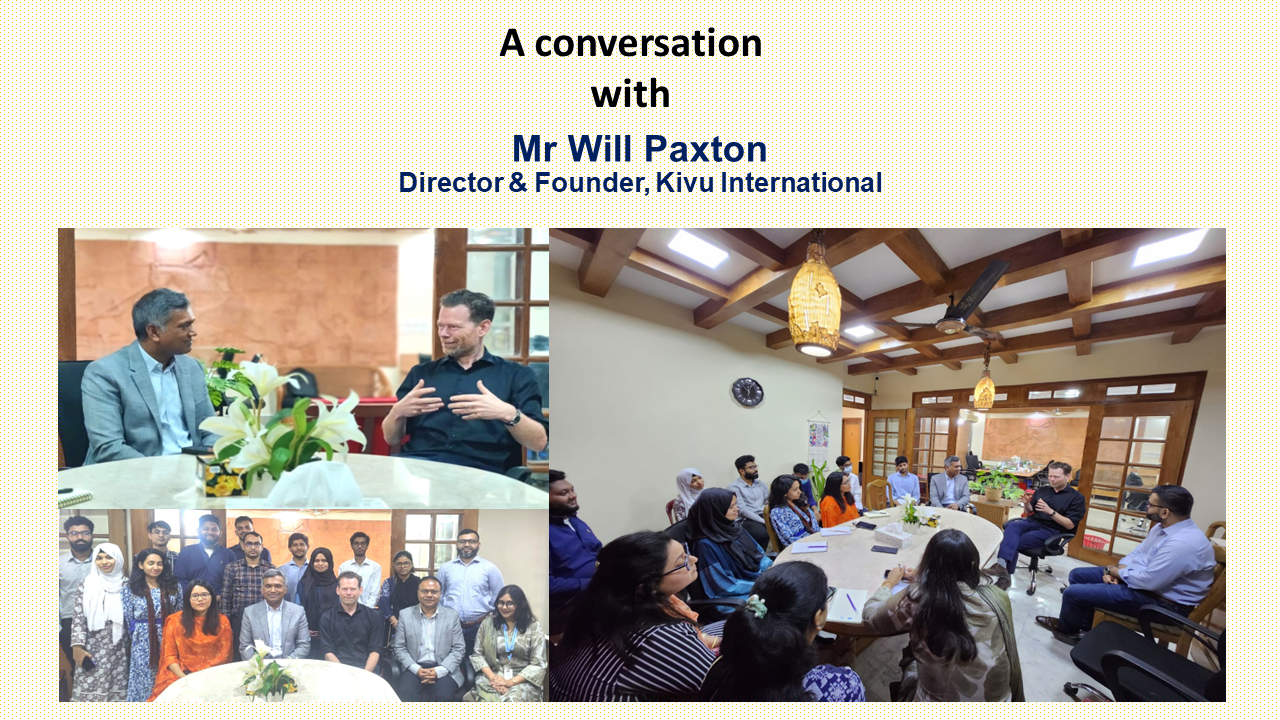A conversation with Mr Will Paxton Director & Founder, Kivu International

Policy Brief: What Will MC13 Decide for Global Trade? A Look at Bangladesh’s Position and Expectations
A candid conversation with Will Paxton, director and founder of Kivu International

Will Paxton, Director and Founder of Kivu International, paid a visit to the RAPID office on March 28, 2024, providing a unique opportunity of having an engaging discussion with him about the pressing issues in policy formulation processes and advocacy, reflecting from his own experience as an advisor to the UK's prime minister to ways to hold different interest groups accountable.
Kivu International has, over the past two years, collaborated with RAPID on various projects, notably in designing tax reforms.
Kivu International has, over the past two years, collaborated with RAPID on various projects, notably in designing tax reforms.
About Will Paxton
Will Paxton is a senior policy professional with experience in policy development and implementation in highly political environments. His background and experience extend from working in think tanks and international NGOs to serving as a senior advisor within the UK government, including the Prime Minister's Strategy Unit, as well as supporting local organisations across developing countries like Zambia and Rwanda.
Some of the core cruxes of the discussion are as follows-
Zara Mustafa: What was your motivation behind launching Kivu, and what’s the story behind naming it “Kivu”?
Mr Paxton: So we were in Rwanda working on a project and one afternoon, we were sitting at the shore of lake Kivu discussing how all of us think there is a lot of potential in the local initiatives that could be utilised by organising and endorsing them, and there we took the decision to initiate Kivu to do exactly that. So you can say we named the organisation in honour of the place that we took this big decision in.Sazzad Ali: So we know you joined the research field as a fresh-blood out of college and then went on to work as the advisor to the British Prime Minister. What was this transition like?
Mr Paxton: Actually, the transition from policy influencing to policy making was often a challenging one, as there are multiple layers of politics and negotiations that you need to undergo before you see actual changes take place. While the long process is often very stressful and frustrating, it’s also equally rewarding to see the impact when it materialises.Samia Borsha: Of all the distinctive roles you’ve worked on, which one did you find to be the most rewarding?
Mr Paxton: It’s tough to pick sides, but you all understand how the government sector is challenging to work in due to stress it comes with, so I’d say I’d enjoyed the research experiences more that have resulted in Kivu being formed, which is very rewarding.Sumaeya Akter: As you have worked in different countries, What would be your take on economic development in Bangladesh?
Mr Paxton: An interesting aspect of the growth model of Bangladesh is the unique interplay between political and economic actors. Distinct from many other developing countries, where political elites and a small, tightly controlled private sector exist, Bangladesh’s political and economic elites are sort of merged together, which has served Bangladesh well and translated into robust growth performance so far. However, in the long term, the model poses an increasing challenge, particularly in implementing necessary broad based policy reforms for development and diversifying the economy beyond the ready made garments sector.Tofail Mahmud. What is the way to deal with crony capitalism obstructing development?
Mr Paxton: The way to do this is to create an alternative where you amplify the voices of the disorganised groups so they have more power, and you come up with a change that does not too directly challenge the interests of the small, powerful group.Fabiha Tasnim: We observe an inaction from the parts of guardian institutions regarding holding the governments accountable in some countries. Is there something that the general public can do to fill in that gap in such circumstances?
Mr Paxton: Those are amongst the binding constraints we have to bear in mind before we start working with policy in any country. Having said that, there are two approaches to going about it. The first one is a rather pragmatic approach where you try to get enough people to care about and bring about changes gradually. The second approach is to organise the people who want to directly challenge the status quo, which can often cause more harm than benefit.Fabiha Tasnim: As you’ve mentioned, this field of research and policy advocacy comes with delayed gratification, so what does it take to hold onto hope and keep working with incremental changes and rewards?
Mr Paxton: (laughs) I don't think there are shortcuts. So, the best approach is to keep your patience and learn to find your reward in the process of learning and pushing yourself to overcome new challenges to get closer to your objectives.“The other thing that you can do to manage your frustration is to focus on the intrinsic range of skills you are building and the kinds of things you get to think about, which can be very rewarding.”
In our conversation, we fondly reminisced about Jack Lovell, who worked so closely with the RAPID team until his unexpected passing earlier this year. Mr. Paxton shared a booklet compiled by Kivu International in remembrance of Jack, highlighting his working with people from different countries and his contributions.



